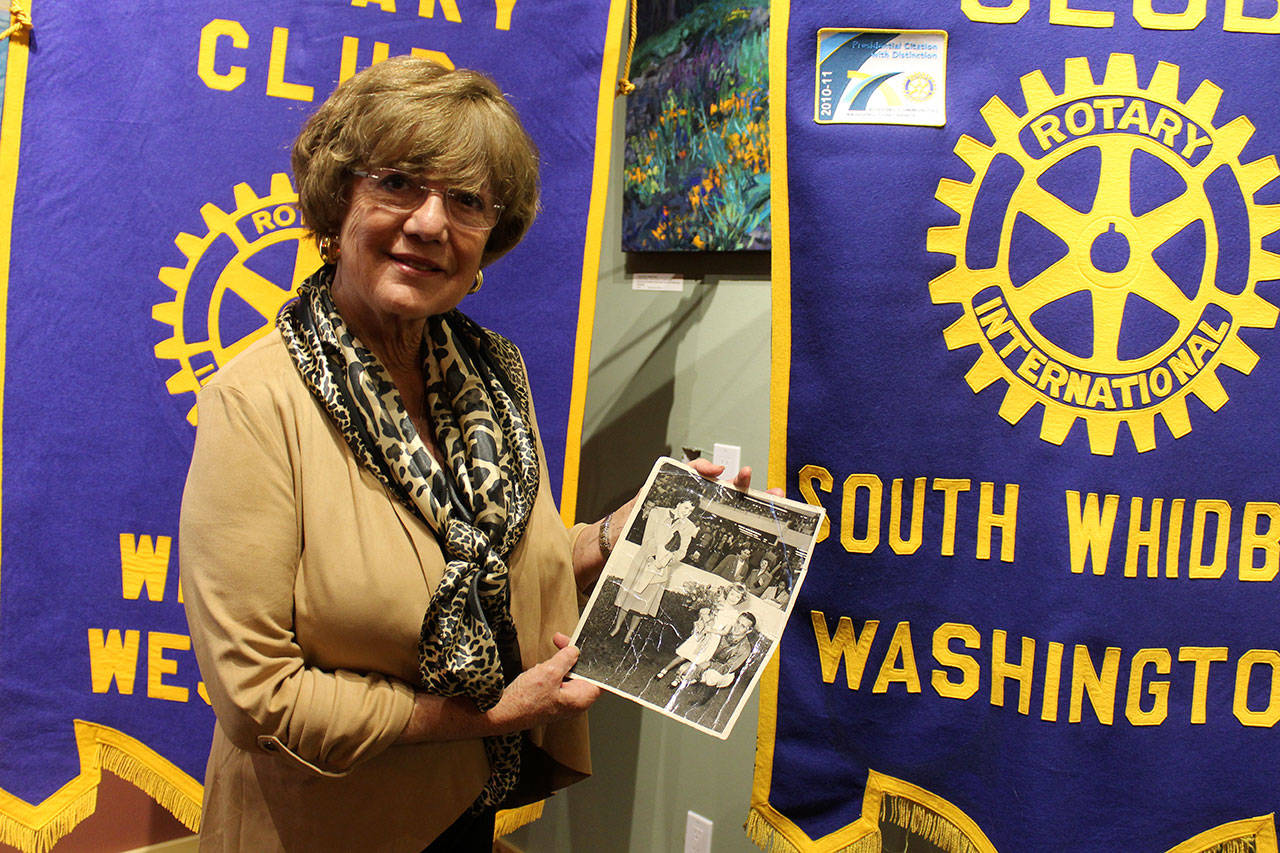She’d just been tucked into her princess bed after an evening out at the circus with her aunts.
“They loved for me to visit them in San Francisco,” Victory Grund said. “They would dress me up and parade me around to their friends. They had satin sheets on my bed and set out a pretty brush and comb set.”
Bedtime milk and cookies were also part of spoiling their first, favorite and only niece, then six years old.
“But when I swallowed the milk it came out my nose,” Grund recalled. “I couldn’t swallow anything.”
Her father made a speedy trip from Redwood City to pick up his daughter whose legs soon started to feel numb.
A family doctor immediately recognized the symptoms – polio. Little Victory, named by parents who never thought they could have a child, needed to be admitted to the children’s polio ward of San Mateo County Hospital.
“There were about 20 kids,” remembered Grund, now 76. “Out of that, 12 of them died. The rest were left with tremendous, horrendous effects.
“But I left that hospital with no severe residual effects. I was in isolation for four months and only saw my parents through a glass window. I lived in an iron lung for three months.”
Grund told her story Wednesday, Oct. 24, on World Polio Day, at an evening gathering of Rotary Club members from two Whidbey clubs, South Whidbey and Whidbey Westside. They met at Bloom’s Wine and Bistro in Freeland.
Since 1988, eradicating polio from the world has been the focus of Rotary International, UNICEF and many global health organizations. Polio was eliminated from the Western Hemisphere in 1994 but it’s still deadly and debilitating in many poor countries.
Polio could soon go the way of smallpox, the only infectious disease declared wiped out from the world in 1980. In 2017, only 22 new cases of polio were reported worldwide, down from about 350,000 new cases reported in 1988.
“In our lifetime, polio will be eradicated,” said Nic Wildeman with the Whidbey Westside Rotary Club. His mother suffered permanently from paralysis caused by polio.
Many recalled the fear and panic the mysterious virus unleashed when it would sweep through, typically during warm summer months.
“Nobody knew how polio spread. Nobody knew its cause,” Wildeman said. “It was terrifying.”
Mass international immunization campaigns planned by armies of volunteers and funded with major financial support by the Bill and Melinda Gates Foundation, and other organizations, are closing in on the incurable disease.
Nigeria, Pakistan and Afghanistan are the three remaining countries where new cases of polio have been reported, down from 125 countries in 1988.
However, declaring polio dead is tricky because the virus is carried by children who may not show symptoms. It’s estimated that for every child paralyzed by polio, there are 200 others who carry the silent virus.
In the United States, it’s recommended children receive the inactivated polio vaccine at 2 months and 4 months of age, and then twice more before entering elementary school.
Holding up a black and white photo, Grund described being selected as the March of Dimes poster child at age nine. She then explained how her polio experience led her to start a nonprofit arts program 10 years ago aimed at special needs children. Called Old Town Artisan Studio, it’s expanded over the years into a campus in La Quinta, Calif., where Grund lives six months of the year.
“Some are on respirators but they can move around and participate,” she said. “Had I not had polio, I’m not sure I would come to realize that people with disabilities need to be more appreciated and valued.”
Millions of children worldwide must continue to be vaccinated each year to prevent a massive resurgence of the highly contagious disease, said Deborah Wright. She described her 2011 trip to Ethiopia with her two daughters to help on the vaccination campaign called National Immunization Days.
Prevention is the only way to stop polio, said Tim Arnold, a South Whidbey resident who just left for his seventh trip to Ethiopia to help with an army of Rotarian volunteers. They spread throughout the countryside armed with liquid oral vaccination; each baby gets a dose of two drops.
“One year we were supposed to immunize 125,000 children in two days at six clinic locations,” he told the gathering. “One of those locations was a tree.”
Rotary helps raise funds to buy leg braces, special shoes and pay for other needs of polio sufferers. Since vaccines are largely covered by other organizations, fundraising goes toward gaps in services.
The Rotary Foundation awarded nearly $700 million in PolioPlus grants from 2010 to 2017, according to The Rotarian magazine. Over 30 years, it’s contributed $1.5 billion toward the End Polio Now campaign.
Arnold estimates he spends between $5,000 to $6,000 of his own money each time he travels to Ethiopia on a polio mission.
“Once you start, it’s hard to not keep doing it,” he said. “Seeing all these kids in surgery and waiting to learn how to negotiate with crutches and braces is crushing.
“Then you see the faces of these little children as you give the (vaccination) drops. They have so many other problems — poverty, water, sanitation, education — you think ‘now there’s one thing they don’t have to worry about.
Polio.’”
• For every dollar that Rotary raises toward polio eradication, the Gates Foundation triples that amount. People can donate at www.endpolio.org


